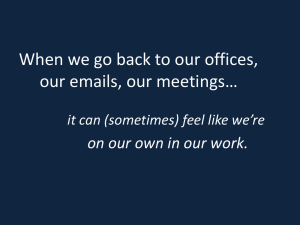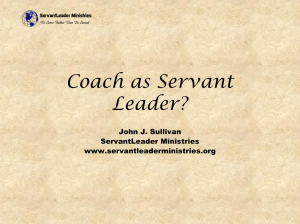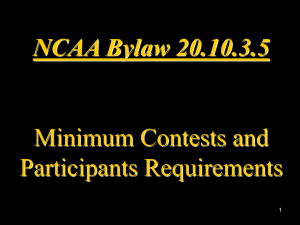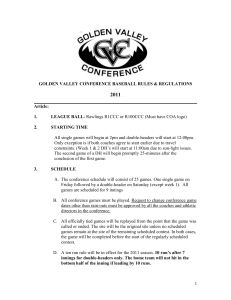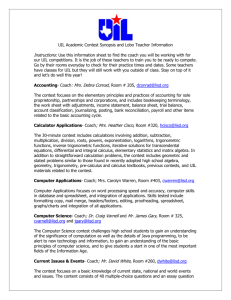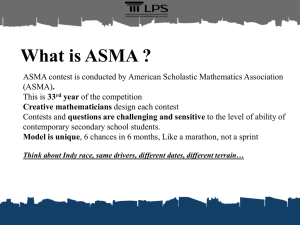Resolving Conflict
advertisement
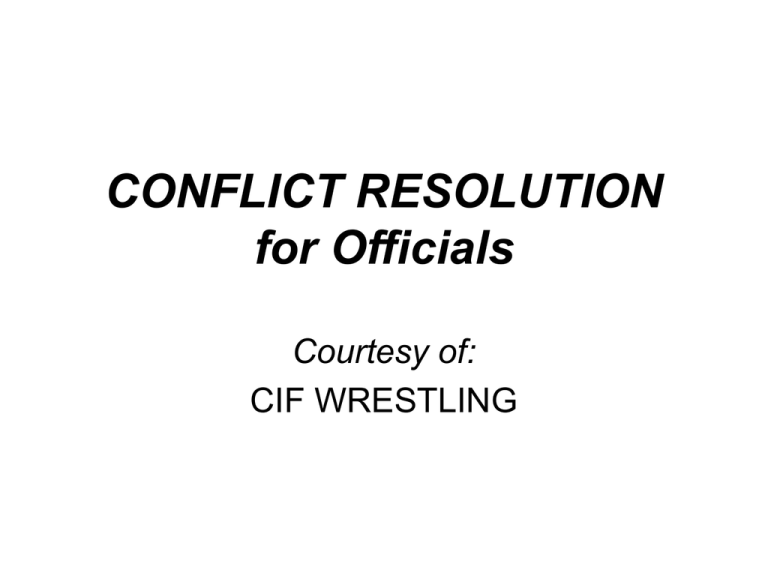
CONFLICT RESOLUTION for Officials Courtesy of: CIF WRESTLING KEYS TO CONFLICT RESOLTUION • Recognize the conflict • Defusing the time bomb: how is it done? • Sharpen your skills: what skills are needed? WHAT IS CONFLICT? • Direct opposition, a clash or disagreement between people • Conflicts are experienced at home, work, social recreation and officiating a contest • As long a you have people dealing with people, making decisions or meeting deadlines, you will have conflict TYPES OF CONFLICTS • Pre-existing (carry over from previous contest) • Spontaneous Reaction – reaction in a critical time in the contest • Cumulative Response – series of call or bad breaks that do not favor one team RESOLVING CONFLICT • For years people in authority just told other what to do • Now, people want to be heard and have a say in what is happening • Therefore, communication becomes very important in resolving conflict RESOLVING CONFLICT • Approach the conflict collaboratively; work with coaches and/or your partner(s) • Simple communication is at the heart of conflict resolution • With every conflict – it’s a matter of listening and seeking to understand the problem • Must be done within the framework of the contest LEVELS OF CONFLICT • INFORMAL: More often handled quickly, less noticeable by others; quick comments to coaches and participants • FORMAL: Needs more attention; more skills necessary to resolve or understand what the coach, player or official has heard or seen KEY COMPONENTS IN RESOLVING CONFLICT • GREAT listening skills • Flexibility • Willingness to change • Agree to disagree LISTENING SKILLS • Maintain eye contact • Do not interrupt; let them finish • Good posture – maintain a nonthreatening position • Mentally rehearse situations in which you might become emotional FLEXIBILITY • Be able to adjust to any situation • Do not try to handled the situation alone; use your partner(s) • Understand you are not going to please everyone; agree to disagree; this is a two way street, but the official has the final say WILLINGNESS TO CHANGE • Get the call right; use your partner • If change is necessary, make the change • Support your partner(s) – you are a TEAM • Understand the psychology of coaches and what motivates them; communicate with them; know your coach DEFUSING THE SITUATION INFORMAL CONFLICTS: • Normal contest situations will not be stopped • Use visual acknowledgement with coach or participants • Use direct eye contact or use a caution sign INFORMAL CONFLICT (continued) • Use short verbal explanation – “I hear you, I will watch for that” – “I saw it differently than that” • Use humor only when appropriate; timing is of the utmost importance with humor • Most of all: know your audience DEFUSING THE SITUATION FORMAL CONFLICT • Contest will temporarily be stopped • You will be directly confronted by the coach. You must evaluate the coach’s degree of intensity. Listen, be flexible, evaluate the situation and make change if necessary • Help your partner with positive information. Let your partner make the call FORMAL CONFLICT (continued) • Defuse the situation. Do not abuse it; get everyone calmed down • Establish your comfort zone and avoid letting a coach into your zone of comfort • Do not lose your composure; this is inexcusable FORMAL CONFLICT (continued) • Always display proper physical demeanor • Maintain good eye contact • Maintain proper posture • Listen rather than challenge • Give quick precise explanation and move forward FORMAL CONFLICT (continued) • Close the situation as rapidly as possible • You could use the following statements: – “Coach, I saw it differently than that” – “We need to get back to the contest” • REMEMBER: Defuse rather than abuse FORMAL CONFLICT (continued) • If conflict continues: – Issue one last formal warning – Administer a yellow card (soccer, volleyball, water polo) • If conflict continues: – Administer the appropriate penalty and restart the contest as soon as possible – Serve as a buffer for your partner NECESSARY CHANGE • If the official is in error, make the necessary change • Explain to the coach and captain(s) of the team effected of the situation and the change • Get the contest started as quickly as possible IN REVIEW • • • • Keep one’s composure Evaluate the conflict Establish your comfort zone You must have: – Good listening skills – Be flexible – Be willing to change if wrong • Use simple communication to keep a situation from escalating IN REVIEW (continued) • Review concerns to see if change is necessary • Use your partner(s) as much as possible • Approach a problem collaboratively • Administer a penalty if necessary; get the contest started as soon as possible

